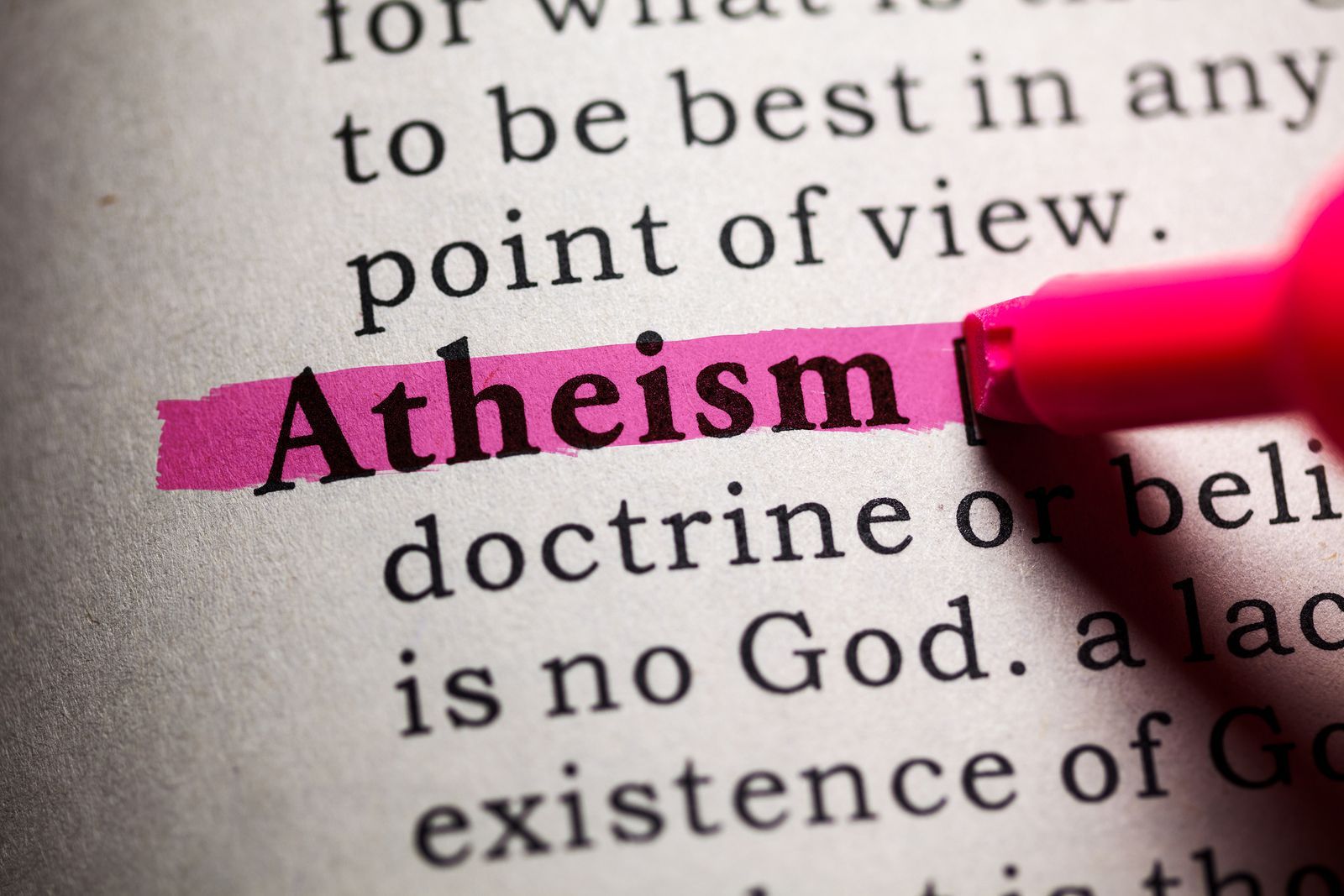
The False Equation of Atheism and Belief Without Evidence
Is it logically sound to equate a lack of belief in something for which there is no evidence with belief in it? Jonathan Edwards explores the fallacies in placing the onus upon atheism to disprove the existence of God.
By Jonathan Edwards
In much of America, an admission of atheism doesn’t make you any new friends. You may even lose friends. Nowhere is this more the case than in the Deep South, where I live. The word atheist is rarely interpreted as the innocuous rejection of conviction without evidence. To many, it literally means the rejection of all that is holy. And who wants to be friends with the devil?
Atheism, however, is simply a natural consequence of rationalism. The Atlantic’s Emma Green wrote an article entitled The False Equation of Atheism and Intellectual Sophistication equating the intellectual rigor of faith with atheism. The article was written several years ago, but the arguments it contains are no less pertinent today. And the fallacies and misguided premises contained therein are in no less need of addressing.
The burden of proof
Green begins by quoting Adam Gopnik, from the New York Times, who wrote, “What the [non- believers], whatever their numbers, really have now…is a monopoly on legitimate forms of knowledge about the natural world.” Green addresses the quote by saying, “This is a perfect summary of the intellectual claim of those who set out to prove that God is dead and religion is false.”
This statement implies two erroneous, but common assumptions. First, by quoting one writer, Green implies that when atheists engage in the “culture war” between belief and disbelief, their mission is to prove the non-existence of something. Second, Green implies that atheists are motivated by a belief that it is possible to prove the non-existence of God. The atheist simply opposes any reliance on a claim for which there is inadequate proof, or in the case of religious claims, no proof at all. This otherwise widely accepted method of sound decision-making is given a special name only when it comes to religion.
“The atheist simply opposes any reliance on a claim for which there is inadequate proof, or in the case of religious claims, no proof at all. This otherwise widely accepted method of sound decision-making is given a special name only when it comes to religion.”
Like Bertrand Russell’s orbital teapot, I don’t believe there is a toaster orbiting Pluto. However, upon learning of my disbelief, no one would feel the need to describe me as an a-toasterist. If I went on to assert that, whether or not the toaster exists, I’m altogether opposed to the toaster’s existence, no one would call me an anti-toasterist. This is because my toaster-opposition poses no threat to any power structure, as there is no Church of the Pluto-Toaster. But when the failure to believe poses a threat to a certain power, that disbelief must be labelled. Then you have something on which to attach all sorts of other assumptions about the people who qualify for the label.

For instance, take the oft-repeated theist idea that without a firm belief in God, one would have no restraints whatsoever against immoral behavior. In that instance, the atheist label acts as a convenient trigger for fears that an atheist—self-described or otherwise—cannot be trusted. Naturally, this would draw some people to the side that is making the argument that atheists suffer from an inherent risk of harming others. This works in secular war as well. You do not garner support for the invasion of another country without providing a label for the enemy on which others can pin their fears.
In Green’s case, the atheist label encompasses the notion of a group who not only believe they have the burden of proving God does not exist, but that they have in fact met that burden completely. This is convenient because it provides a “gotcha” moment in which believers can claim arrogance on the part of the atheist. Even more conveniently, it shifts the burden of proof away from the one making ridiculous claims, such as that Earth is 6,000 years old.
It is not the atheist’s onus to prove that anything doesn’t exist. The atheist only reveals that those who claim to provide proof of God’s existence, and especially those making specific claims about God’s desires, are either misguided or wilfully deceptive. Of course the burden of proof is on the claimant, and for good reason.
Beyond a reasonable doubt
Imagine a scenario in which I accuse my neighbor of rape on faith alone. The neighbor is charged and brought to court. The judge seats the jury and explains that my neighbor has been charged with rape. The judge then explains to the jury that, at the end of the trial, their job is to decide whether my neighbor has proven beyond a reasonable doubt that my hunch about him couldn’t possibly be correct. At the end of the trial, the jury should then tell the judge that they will have to continue their deliberations until mankind has uncovered every possible way of knowing a rape has occurred. How else could they know for sure that I don’t possess some esoteric key to sensing a rapist? Instead we put the burden on the person making the claim, because they have the knowledge the jury is lacking.
Additionally, for rational people, the amount of proof expected is commensurate to the weight of the consequences of accepting the claim. For instance, if you file a civil lawsuit against your neighbor, the consequence may be that your neighbor pays you a sum of money, and may be ordered to cease some ongoing behavior. He is otherwise free to continue living his life. Here, you must only prove your case against him by a preponderance of the evidence. Slightly more than half of the evidence must weigh in your favor. On the other hand, if you accuse your neighbor of a crime, the consequence may be that he is incarcerated and loses most of his liberty. Here the state will have to prove the case beyond a reasonable doubt.
Only one reasonable doubt that he committed the crime is enough to acquit him. What then is the burden of proof on the person who makes a claim not only to know God exists, but to know what God thinks, feels, wants, and demands from the rest of us who are not fortunate enough to hear his voice? Atheists do not need to prove the non-existence of God. It is enough to point out that every attempt to prove God’s existence thus far has failed miserably, whereas evidence-based searches for truth regularly succeed with tremendous benefit to society.
“Only one reasonable doubt that [the defendant] committed the crime is enough to acquit him. What then is the burden of proof on the person who makes a claim not only to know God exists, but to know what God thinks, feels, wants, and demands from the rest of us who are not fortunate enough to hear his voice?”
Can we disprove a universal negative?
Atheists who oppose religion are not motivated by a belief that it is possible to prove the non-existence of God unequivocally. This is where we must distinguish and reconcile the term atheist with agnostic. An agnostic is someone who denies that a certain theistic proposition is knowable or provable. Atheism is the disbelief in a god or gods. Atheists who wish to be more precise often describe themselves as agnostic-atheists, to concede that they lack the capacity to definitively disprove the existence of God by any definition. To be sure, this truism has nothing to do with atheism and everything to do with rationalism, a subject I’ll address later. The agnostic-atheist label doesn’t necessarily reflect the level of disbelief of a particular person. As Richard Dawkins pointed out in The God Delusion, there are varying degrees of certainty among people who claim belief or disbelief in God. Dawkins divided the certainty into 7 levels between absolute belief in God and absolute disbelief. If the scale is 1 to 7, with 1 being 100% confidence in the existence of God, and 7 being 100% disbelief in the existence of God, an intellectually honest atheist would put himself shy of 7 by some fraction between 6 and 7. Atheists for whom historical attempts at theism hold the most weight, may rate themselves as high as 6.99.
Atheists have no problem conceding that they’re unable to be 100% sure of anything. That’s because the same is true for any topic explored with rationalism, and thus the concession does nothing to bolster the claims of a theist. Atheists are motivated because those who claim to know a certain god exists have no evidence, and thus the scales that balance belief and disbelief, so far, weigh heavily in the atheist’s favor.
Education, intelligence, and the believer
Green goes on to read Gopnik’s quote as an “epistemological assumption…[that] atheists have legitimate knowledge, and those who believe do not.” The argument of “vocal atheists[,]” Green asserts, is that “believers aren’t educated or thoughtful enough to debunk God, and if they only knew more, rational evidence would surely offset faith.” Atheists are well aware that many believers possess the thoughtfulness and education to offset religious faith. Education and thoughtfulness are not always the problem. The problem among the educated is the deliberate choice to suspend their use of “legitimate knowledge” when it comes to the topic of religion.
Some people may lack the intelligence to comprehend the arguments on both sides of the issue. That’s true for many issues beyond religion. But many very intelligent people simply suspend reasoning when it comes to religion. Why? It would take at least a book to begin exploring all the reasons why otherwise intelligent people suspend reasoning when it comes to religion. Some are lying, to themselves or others. They may desire the social comfort of a church community, especially when raising a family. I’ve encountered numerous people who, privately, concede the incredulity of the idea that woman was made from man’s rib—perhaps women especially. But they also describe the social and emotional benefits of going along with the crowd.
Church provides plenty of valuable social connections and plenty of palatable egotism. Of course, many religious leaders lie because it benefits them financially. When the expected contribution is 10% of the lambs’ income, that’s a tempting return for an investor whose work primarily involves inculcating a sense of egocentrism in a species already prone to it.
Other people may suffer psychological dissonance if they stop believing in their family’s brand of religion, especially if they are close with their family. After all, it’s essentially saying, “The most cherished people in my life are wrong.” It may be easier to accept that somewhere out there is a rational reason for believing that you haven’t discovered yet. For others, their ego may be so fragile already that admitting (internally) to wishful thinking on such a profound subject may be too devastating. Thus the mind excuses the jury while it deals with the subject of religion.
Deism vs theism
Green notes that because “smart, respected, insightful people thought and felt their way out of believing in God…that doesn’t mean the average believer’s search for meaning and understanding is any less rigorous or valuable—it just ends with a different conclusion: that God exists.” Here it is important to distinguish between deism and theism. The conclusion that God exists usually entails theism, and it’s theism that poses the danger. Deism is a belief that the universe must have had a creator, but that the creator is indifferent towards the creation. It is an acquiescence to the seemingly logical conclusion that because there must have been a beginning, there had to be a beginner whom we are entitled to label God, but that God has no interest or influence in our daily lives. Theism, on the other hand, asserts not only that God exists, but that God is involved in our lives and has a plan for us whether we like it or not. Worse yet, theists have knowledge of this god’s values and motive that non-believers somehow missed. Moreover, theists of one persuasion have knowledge that other theists missed in their talks with God. The wrong theists are apparently receiving celestial prank calls.
Most believers are theists of one form or another. Even when believers claim to know next to nothing of how God thinks, they at least assert that “God is love” or ascribe some other reductionist attribute to the deity. However nice it feels to reduce God to a simple idea of love, or any motive, it still begs the question: How do you know that?
Even though most believers are theists, the number of theists versus true deists is of little importance. That’s because in the “culture wars” described in the article, atheists are out to expose the inane assumptions of theists. Otherwise, we’d call them a-diests. It’s not only the overtly dangerous religious zealots that atheists fight against. It’s also the moderates, who still claim to have a sense of what God appreciates or abhors. Those beliefs, however moderate, are rooted in the absence of evidence. An absence of evidence is the same basis on which radicals build their ideas. When moderates uphold faith as a virtue, they validate an irrational basis for forming ideas, including dangerous ones. To the extent moderates disagree with radicals, it is not due to the inherent absurdity of forming any belief on faith alone. It is because they reject the ideas on some empirical basis independent of faith. For instance, there are numerous empirical reasons that it’s a bad idea to kill people simply because they disagree with you. Faith, however, suspends rationalism and ignores empiricism whenever it’s convenient. Both of these concepts are absolutely necessary when attempting to solve problems, moral or otherwise.
“An absence of evidence is the same basis on which radicals build their ideas. When moderates uphold faith as a virtue, they validate an irrational basis for forming ideas, including dangerous ones.”
A simple conclusion that God exists has virtually no impact on anything, but that’s not what the “culture war” is about. It’s about all the other conclusions drawn from that conclusion, which reflect the proclivities of the individual drawing them. That is the danger, and that is the atheist’s concern.
Conflating popularity with truth
Green opines that “full engagement with the project of being human in the modern world” does not lead to atheism, as “Only 16 percent of the world’s population was not affiliated with a particular faith as of 2010, although many of these people believe in God or a spiritual deity….” It’s safe to assume that part of being fully engaged with the human project involves rational behavior. And I see two issues with relying on numbers to show the rationality of faith. First, the popularity of an idea has nothing to do with whether it’s rational to believe it. Again, people can suspend rational thinking in certain instances, for a variety of reasons, and with mixed motives.
Moreover, surely there was a time when polling would have revealed an enormous number of people who had faith that the sun revolved around the earth. Even a month before Green’s article was written, NPR published the results of an NSF survey that found “1 In 4 Americans Thinks the Sun Goes around the Earth.” And the Flat Earth Conference last year, in North Carolina, attracted over 500 attendees.
This reveals the second problem: Statistics often reveal that a startling number of people believe things that are demonstrably false. Again, the popularity of an idea is irrelevant to truth. Whether an assertion is true or false, it remains that way regardless of what people—few or many—believe.
“Whether an assertion is true or false, it remains that way regardless of what people—few or many—believe.”
In conclusion
Conviction without evidence is not the modestly noble, intellectual equal of disbelief in the absurd. The belief that it is has wrought havoc on humanity in the most wicked forms. It can continue doing so in unlimited scope, as it is unrestrained by rationalism. As long as the studied empiricist shares an equal platform with the egoist of pure faith, our greatest problems will take longer to solve. Sentiments like Green’s keep us tethered to this unfortunate reality.

